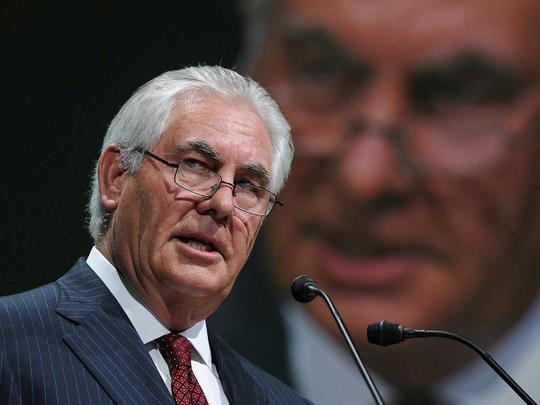
Dubai: US President-elect Donald Trump is keeping the world on its toes. As he continues shaping his new administration, he is gradually showing how America’s role is going to look different under him, Arab analysts say. And that includes picking a lifelong boy scout as his Secretary of State — Rex Tillerson, the chief executive officer of ExxonMobil.
“The choices of the new US administration members are all related to Trump’s vision of the world,” said Hassan Abu Taleb, a senior analyst at the Cairo-based Al Ahram Strategic Studies Centre. “And Trump’s view is purely built on interests — not relations.”
Appointments of Secretary of State, whether by Republican or Democrat administrations, had mainly been based on political commitments to certain values and interests, as well as obligations towards the world and its different regions, Abu Taleb told Gulf News.
“Now all these commitments are changed and we are going to enter an era of compromises across the world,” he noted, adding the new US administration is going to be dealing with world issues purely on the concept of give and take.
“It’s a hawkish administration, but inclined more towards economic and trade diplomacy,” explained Saudi political scientist Waheed Hamza Hashim. He believes that as Trump is truly independent and not a pure Republican, he is appointing figures that reflect his opinions and don’t ally with traditional partisan views.
“They are still part of the establishment,” noted Musa Shtewi, the director of the Centre for Strategic Studies at the University of Jordan.
“Trump is building a team to implement his views on different basic issues,” Shtewi told Gulf News.
“Ultimately, Trump never hid his views in a closet and is only revealing them now. No. Why are people surprised now by his appointments?” he asked, adding that they reflect his view of the world.
While Trump was campaigning during the election, he always said he would take a closer position to Israel, a tougher stand against Iran, and he would do more to counter terrorism, Shtewi said. His slogans raised concerns and fears in the Arab world, particularly those related to the Palestinian cause.
“If Arabs had a unified stand, any US president wouldn’t be able to change it,” Shtewi said. “We do not have a unified view on how to deal with Israel. We do not have a unified view on how to deal with Iran. And we do not have a unified view on how to deal with terrorism. If anything, the concern for Arabs should be their lack of any unified position.”
Some analysts interviewed by Gulf News said that they expect the US congress, dominated by Republicans, to reject the nomination of Tillerson, in part because he has a close relation with Russian President Vladimir Putin.
Yesterday, both Republican and Democratic lawmakers had warned that Tillerson would face intense scrutiny over his two-decade relationship with Russia, which awarded him its Order of Friendship in 2013, and with Putin in particular.
“The real political conflict is in Washington,” said Palestinian political analyst Mahdi Abel Hadi, the founder and head of The Palestinian Academic Society for the Study of International Affairs based in occupied East Jerusalem.
He noted that there is a sharp division in the US now, it has moved towards extremism, discrimination and there is now a culture of fear in American society.
“As for the impact on the Arab world, it is still premature to judge,” Hadi said.
“Trump is either going to be a minimalist with no comprehensive vision or understanding of Middle East complexities, or he risks being provocative and going in hard over a crisis that should be managed or de-escalated,” said Emile Hokayem, a senior fellow at the International Institute for Strategic Studies’s Middle East office in Bahrain.
“Trump seems prone to say something outrageous and then try to walk it back, still damaging US standing, credibility and relations with Middle Easterners.”












